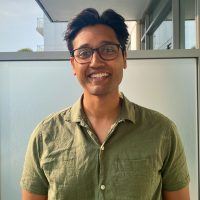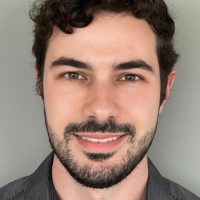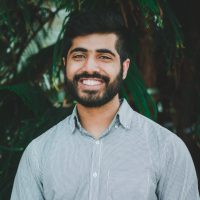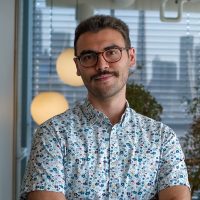Five U of T Engineering graduate students working on a range of problems — from mitigating the issue of space debris to enhancing the affordability of diabetes monitoring — have been awarded Vanier Canada Graduate Scholarships for 2023.
Providing $150,000 in funding over three years, the scholarship recognizes PhD candidates at Canadian universities who demonstrate excellence in the areas of leadership, research impact and academics.
This year’s recipients are:
Craig Fernandes (MIE PhD candidate)

Fernandes’s research applies mathematical optimization techniques to ‘superstar’ labour markets — such as sports and entertainment — where a select few workers earn disproportionately higher salaries compared to their peers.
To address this income disparity challenge, he is using income pools as a risk-mitigation strategy.
“An income pool involves participants voluntarily agreeing to share a portion of their future earnings with the group if they reach a specific salary level or career milestone,” he says.
Co-supervised by Professors Timothy Chan (MIE) and Ningyuan Chen (Rotman Management), the team’s study is the first mathematical analysis of these pools, exploring the economic incentives, stability and optimality.
“I’ve been interested in operations research ever since my undergrad studies in industrial engineering at U of T,” says Fernandes. “This interest has been further fostered by Professor Chan’s great mentorship.
“I was really interested in how these methods could apply and help real-world, interesting scenarios, which is what led me to income pools.”
Pedro Guerra Demingos (MSE PhD candidate)

Guerra Demingos is supervised by Professor Chandra Veer Singh (MSE) and researches materials simulations at the atomic scale.
“These models are a powerful tool to study new nanomaterials and how to enhance their properties, which is the focus of my PhD thesis.”
Guerra Demingos is designing materials that show promise for a wide range of applications.
“For example, some can be used in glucose detection and quantification, which can be leveraged for diabetes monitoring at lower prices than current technologies,” he says.
As a child, Guerra Demingos watched his father sketch atomic structures on his notebook.
“He was an established civil engineer, with a passion for research that led him to pursue a masters in material science,” says Guerras Demingos. “I knew then that I wanted to work on research on the same field.
“It feels reassuring to receive a Vanier scholarship – it tells me that other people are as excited about my work as I am.”
Muhammad Maaz (MIE PhD candidate)

Maaz is working in matching theory, a field that studies how to best match two sets of things, which can be used as a framework to design and study all sorts of markets.
Inspired by healthcare applications of matching, he is particularly interested in studying what happens when matching algorithms have subpar performance. He is doing this through the lens of other fields of mathematics such as graph theory and combinatorics.
“All markets with two sides can be thought of as matching problems: for example, connecting buyers and sellers on an online marketplace, pairing riders and drivers on ridesharing apps, or matching organ donors with patients,” says Maaz.
“My work can be used by market designers to increase the performance of such markets, thereby ensuring more people are matched, or finding higher quality matches.”
Maaz is especially grateful to be supervised by Professor Timothy Chan, who is world-renowned for his work in optimization and healthcare, he says.
Stefan Mladjenovic (BME PhD candidate)

Delivering nanoparticles to targeted areas of the body can help clinicians treat cancer while leaving healthy cells alone. Mladjenovic’s research focuses on the barriers that these nanoparticles still face in terms of their ability to target tumours.
“Currently, only about 0.7% of injected nanoparticles reach tumours,” he says.
Supervised by Professor Warren Chan (BME), Mladjenovic is working to better understand the biology of solid tumours and the barriers that impede drug delivery.
“This improved understanding may guide us to design nanoparticles that can bypass these barriers so that more drugs in nanoparticles can reach tumours and improve clinical outcomes,” he says.
“We may also be able to screen tumour biopsies to evaluate which nanoparticle drugs will be useful for treatment.”
Mladjenovic became interested in cancer research during his mother’s six-year battle with cancer. She passed away less than a month before he began his undergrad studies.
“Being a Vanier Scholar connects me with a network of peers across Canada who care about helping their communities and are committed to leadership and research,” he says.
Sean Wolfe (UTIAS PhD candidate)

Wolfe, who is supervised by Professor Reza Emami (UTIAS), is researching space debris and minimoons, which are small asteroids that briefly become a second moon.
“Space debris is a big concern for the aerospace community,” he says. “Researchers believe that if we can remove the biggest pieces of debris — those that when they collide with other debris create much more debris — then the problem can be mitigated in its entirety.
“Minimoons, on the other hand, are a completely new concept.”
Wolfe is investigating the use of a new 4D light detection and ranging (LiDAR) sensor to better characterize space debris. His research team is also planning a mission to a minimoon to learn how to better detect them.
“Currently, bringing back several hundred grams of asteroid costs around $1 billion US,” he says.
“By targeting minimoons, we would be bringing back metric tons of asteroid — hopefully at a fraction of the cost.”
– This story was originally published on the University of Toronto’s Faculty of Applied Science and Engineering News Site on August 29, 2023 by Safa Jinje.